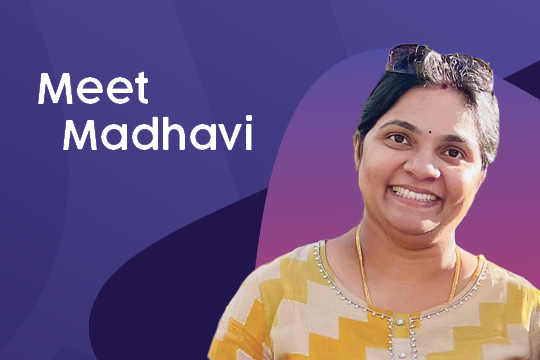Did you know Rocky Bay delivers a Community Nursing service where our experienced nurses visit our customers in the comfort of their home, seven days a week. Whether they need ongoing care or occasional support, our nurses provide professional care tailored to their needs.
We had a chat with the wonderful Madhavi, one of our Community Nurses! Madhavi gives us insight into her role as a Community Nurse, including the difference between Community Nursing and other Nursing roles, and the life-changing support she provides to our customers.
Can you tell us a bit about your role as a Community Nurse and what your day-to-day work typically involves?
As a Community Nurse, I provide both clinical and person-centred care to individuals within their homes and community environments. My daily responsibilities include tasks such as medication administration (including insulin), wound care, catheter and PEG tube management, as well as managing suprapubic catheters (SPCs). Each day typically begins with reviewing referrals and organising visits based on the urgency of clinical needs. I also collaborate closely with general practitioners, pharmacists, allied health professionals, and support staff to deliver a well-coordinated and holistic care plan for each customer.
How does community nursing differ from other types of nursing roles?
Community nursing differs significantly from hospital-based roles in that it’s delivered in non-clinical environments — usually in the customer’s home. It requires a high level of autonomy, clinical decision-making, and adaptability. You work independently without immediate access to colleagues or equipment, so critical thinking and problem-solving are vital. Additionally, community nurses develop long-term relationships with customer, which enables continuity of care and allows for better understanding of the social, cultural, and emotional factors that influence health outcomes.
What kind of support do you provide to customers in the community?
We offer comprehensive support that combines clinical care with health education. This includes services like wound care, stoma and continence management, diabetes education, falls prevention, post-operative care, and support for individuals with complex or life-limiting conditions. Additionally, we help customers navigate the healthcare system by coordinating GP reviews, specialist referrals, and connecting them with community resources or aged care services. Our aim is to empower customers to manage their health independently and safely.
Can you share a memorable experience where you felt your work made a real difference to our customer’s life?
I once worked with a customer who had recently been discharged from hospital after a leg amputation. She was anxious, isolated, and unsure how she would cope at home. Over the course of several months, I supported her with wound care, medication management, and coordinated her rehabilitation services. Gradually, she regained her confidence, learned to use a prosthetic, and eventually began attending social activities again. Seeing her regain independence and quality of life was one of the most rewarding experiences of my career.
How do you build trust and relationships with the people you support?
Trust is built through consistency, respect, and open communication. I always take time to listen, explain procedures clearly, and involve customers in their care decisions. I respect their home as their space and adapt my approach to suit their preferences and cultural backgrounds. Reliability is also key — showing up when expected and following through on care plans creates a strong foundation for trust.
What additional training have you completed, and how has it enhanced your role?
I’ve undertaken additional training in wound management from Silverchain, Palliative care . I’ve also completed certification in infection prevention and cultural competency. This training has equipped me to handle more complex clinical situations, make evidence-based decisions, and deliver care that aligns with best practice standards. It also gives customers confidence that they’re receiving skilled, up-to-date care.
What do you find most rewarding about your job?
The most rewarding part of my job is being able to support people in their own homes — where they feel safest and most comfortable. I take pride in helping people avoid hospital admissions, stay independent longer, and live with dignity despite illness or disability. Every small win — whether it’s a healing wound or a smile of relief — reminds me why this work is so important.
How do you and the team work together to deliver quality care?
We communicate regularly and support each other with updates, advice, and collaborative planning. Everyone brings unique skills, and we really value that shared expertise. It’s very much a team effort, with the customer at the center of everything we do.
In your view, why is community nursing such an important service?
Community nursing plays a critical role in the broader healthcare system by supporting people to remain in their homes and avoid unnecessary hospitalisation. It promotes preventative care, early intervention, and long-term health management — especially for ageing populations and those with chronic illnesses. By delivering personalised care in familiar settings, community nursing enhances quality of life and reduces strain on acute care services.
Find out more about Community Nursing here: https://www.rockybay.org.au/services/health-wellness/nursing/
